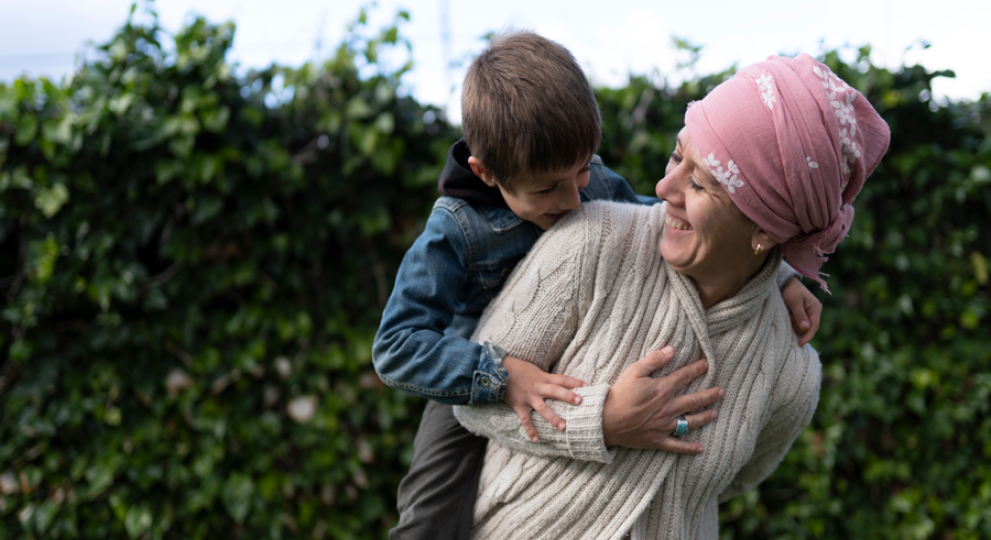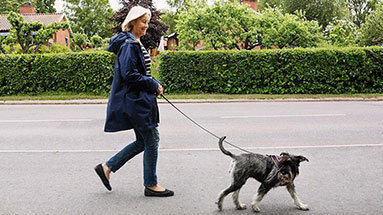Parenting with cancer is hard, but you don’t have to do it alone
Parenting with cancer is hard, but you don’t have to do it alone

Taking care of yourself may be difficult when living with cancer. How can you be expected to care for others, too?
For many parents living with cancer, this is the question. A cancer diagnosis doesn't stop the day-to-day responsibilities of parenting. If anything, it’s likely to make already-demanding tasks even harder.
How do you get kids to and from soccer practice when you have fatigue? How do you cook dinner when you have nausea? How do you ask for help with childcare without feeling like you’re burdening family or friends? How do you carve out moments of joy and normalcy with your children during a time that may feel anything but normal?
There’s no sugar-coating it: parenting with cancer can be hard. It can lead to stress, worse quality of life, and even influence treatment decisions. You may want to shield your children from the realities of cancer while still being honest and emotionally present — a tricky balancing act.
Children, of course, are perceptive. They may pick up on your emotions like stress, fear, and sadness, even if no words are spoken. They may feel confused, angry, or afraid. Research shows that children living with parental cancer may be at an increased risk for various emotional and behavioral issues. And they may find it hard to process and speak their feelings.
First, it’s important to remember that parenting with cancer is not something you have to do alone.
This may include seeking help from professionals. “Ask for help,” Dr. Claire McCarthy, a pediatrician and professor at Harvard Medical School, wrote in Harvard Health Publishing. “Talk to your pediatrician. Get a referral to a social worker or mental health provider. Reach out to your faith community or any other available support. It takes a village to raise a child, and this is especially true when someone that child loves is sick.”
As you ask for help from others, it’s important to show compassion for yourself.
Parents with cancer may feel like they are not good enough if they can’t do the things they used to do before, including caring for their children. It’s important to be kind and compassionate to yourself because it allows you to acknowledge challenges you’re facing without guilt or shame.
Here are some Microsteps to consider that may help ease your role as a parent while navigating cancer. As always, consult with your care team for the guidance and recommendations that are best for you.
Arranging for another trusted adult to spend time with your children.
Older children and teenagers especially may benefit from the chance to connect with an adult who isn’t their parent. If someone in your life is providing practical support, like picking kids up from school, this can be an opportunity for them to spend some more quality time with your children.
Scheduling regular check-ins with another parent in your support network.
This is an opportunity to tell them how you’re feeling and get a fellow parent’s views. Consider a Sunday phone call where you can look ahead to the next week, or a morning coffee.
Asking someone in your network to help you with meals once a week.
When asking for help, try to be clear and specific about what you need. For example, if your treatment schedule makes it impossible for you to cook for your children on Mondays, you can reach out to someone that can help you and let them know what you need.
Asking a friend to help with child dropoffs and pickups.
If your kids need to be taken to and from school or other activities like sports or playdates, asking for transportation help or setting up a carpool can help reduce your day-to-day responsibilities and give you time to rest.
Asking a friend to take one afternoon or evening a week to help with household chores.
Try to give them specific assignments that ease your burden, like doing laundry, cleaning the bathrooms, or making school lunches. This may help you to put your time and energy toward being with your children or resting.
Having a friend “on call” to support you with unexpected needs.
Choose someone you trust for specific days (and nights) of the week when they can be available to step in if unexpected issues arise or if you’re not feeling well. Having a plan in place can give you peace of mind and avoid in-the-moment stress around asking for help on short notice.
Picking one activity that helps you recharge and making time for it each day.
Many parents feel they need to be “on” all the time for their children, but setting aside time just for yourself is important too.
A bath, a walk outside, or a few minutes of reading may help you recharge your physical and mental batteries. This may help you feel more present and joyful when you’re with your kids. So, let a partner or trusted friend handle parenting responsibilities while you focus on yourself.
Developed with Thrive Global














